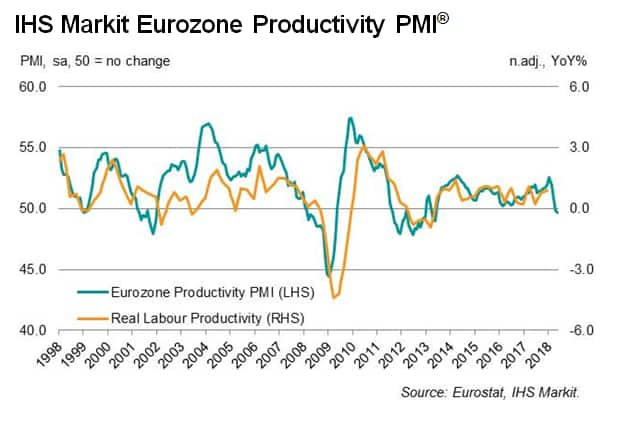Customer Logins
Obtain the data you need to make the most informed decisions by accessing our extensive portfolio of information, analytics, and expertise. Sign in to the product or service center of your choice.
Customer Logins
ECONOMICS COMMENTARY
Jun 12, 2018
May sees deterioration in eurozone workforce efficiency
- Productivity falls at manufacturers and service providers
- France sees upturn in output per head, while declines are evident in Germany and Italy
- Efficiency loss in Italy ends one-and-a-half year sequence of growth
After having broadly stagnated in April, eurozone productivity declined midway through the second quarter. Efficiency losses were recorded in both the manufacturing and service sectors, with the quicker fall evident in the former. Germany saw the third successive drop in output per head, while Italy posted the first contraction in over one-and-a-half years. France was the brightest spot in May, registering growth for the twenty-second straight month.
The seasonally adjusted Eurozone Productivity PMI® - derived from IHS Markit's national manufacturing and services PMI survey data - fell from 49.9 in April to 49.7. The latest figure was the lowest since May 2013, but indicative of only a marginal rate of reduction. The deterioration in workforce performance was widespread across the manufacturing and service sectors. In the former, the fall was the third in successive months and the fastest since the end of 2012. Service providers, on the other hand, recorded the first drop since July 2016, albeit one that was fractional.

Germany remained an area of weakness as workforce efficiency deteriorated for the third straight month. Although modest, the pace of contraction was the quickest in nearly six years and sharper than that seen in Italy. Whereas goods producers registered a sharper rate of reduction, a slowdown was noted in the service economy.
Workforce efficiency in Italy has failed to gain momentum from the near seven-year peak noted at the start of the year. Growth has eased in each survey period since, with May highlighting the first fall in productivity in 19 months. The downturn was centred on the service sector, with expansion sustained among goods producers. The upturn in the latter was nonetheless the second-slowest in the current 18-month sequence of increase.
At the other end of the scale was France, the only nation monitored to register growth of private sector productivity. May's upturn stretched the current sequence of expansion to 22 months and was broad-based across the manufacturing and service categories. At the composite level, growth softened to a 17-month low and was below its long-run average. The slight increase noted in the service sector was stronger than the marginal rise seen at goods producers.
Pollyanna De Lima, Principal Economist, IHS Markit
Tel: +44-1491-461-075
pollyanna.delima@ihsmarkit.com
Purchasing Managers' Index™ (PMI™) data are compiled by IHS Markit for more than 40 economies worldwide. The monthly data are derived from surveys of senior executives at private sector companies, and are available only via subscription. The PMI dataset features a headline number, which indicates the overall health of an economy, and sub-indices, which provide insights into other key economic drivers such as GDP, inflation, exports, capacity utilization, employment and inventories. The PMI data are used by financial and corporate professionals to better understand where economies and markets are headed, and to uncover opportunities.
Learn how to access and receive PMI data
© 2018, IHS Markit Inc. All rights reserved. Reproduction in whole or in part without permission is prohibited.
{"items" : [
{"name":"share","enabled":true,"desc":"<strong>Share</strong>","mobdesc":"Share","options":[ {"name":"facebook","url":"https://www.facebook.com/sharer.php?u=http%3a%2f%2fwww.spglobal.com%2fmarketintelligence%2fen%2fmi%2fresearch-analysis%2fmay-sees-deterioration-in-eurozone-workforce-efficiency.html","enabled":true},{"name":"twitter","url":"https://twitter.com/intent/tweet?url=http%3a%2f%2fwww.spglobal.com%2fmarketintelligence%2fen%2fmi%2fresearch-analysis%2fmay-sees-deterioration-in-eurozone-workforce-efficiency.html&text=May+sees+deterioration+in+eurozone+workforce+efficiency+%7c+S%26P+Global+","enabled":true},{"name":"linkedin","url":"https://www.linkedin.com/sharing/share-offsite/?url=http%3a%2f%2fwww.spglobal.com%2fmarketintelligence%2fen%2fmi%2fresearch-analysis%2fmay-sees-deterioration-in-eurozone-workforce-efficiency.html","enabled":true},{"name":"email","url":"?subject=May sees deterioration in eurozone workforce efficiency | S&P Global &body=http%3a%2f%2fwww.spglobal.com%2fmarketintelligence%2fen%2fmi%2fresearch-analysis%2fmay-sees-deterioration-in-eurozone-workforce-efficiency.html","enabled":true},{"name":"whatsapp","url":"https://api.whatsapp.com/send?text=May+sees+deterioration+in+eurozone+workforce+efficiency+%7c+S%26P+Global+ http%3a%2f%2fwww.spglobal.com%2fmarketintelligence%2fen%2fmi%2fresearch-analysis%2fmay-sees-deterioration-in-eurozone-workforce-efficiency.html","enabled":true}]}, {"name":"rtt","enabled":true,"mobdesc":"Top"}
]}




